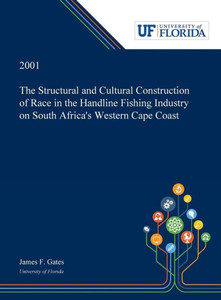Abstract: The primary aim of this dissertation is to describe how race relations are socially constructed and historically situated through an analysis of the relationships between coloured and white fishers in South Africa's handline fishing industry. In-depth interviews with 102 handline ski-boat skippers on the Western Cape coast serve as the core data for this analysis. My primary aim was achieved by interpreting the images skippers use to describe themselves and others, and analyzing of the skippers' perceived social networks. This dissertation moves beyond common political and macro-economic analyses of race relations to in-depth exploration of the ways individuals structure social relations by race in a historically specific context. I show how fishing is embedded in a host of social and informal economic relations. Socioeconomic relations off the boat directly impact social relations on the boat. "Race" and "ethnicity" are historically specific and socially constructed categories of group differentiation. "Race" and "ethnicity" are compared as analytical tools in the methodological tool chest of social analysts. Specific attention is paid to the role that anthropology played and continues to play in the use of these concepts as analytical categories. I argue that in the South African context, both past and present, race remains the most potent construct of social categorization. Specifically, I sketch the history of the ideology and politics involved in the development of "coloured" as an identifiable group in South Africa. Descriptions of the structural development of this category are balanced by the role of human agency. I review the historical roots of those categorized as coloured, the common stereotypes associated with being coloured, the challenging issue of race mixing, the role that intra-racial politics played and the role that language played in the debate over coloured identity. Anthropology as a discipline is in danger of being rent in two by the tensions between those who practice it as a scientific enterprise designed to explain human variation and those who practice it as an experience designed to be shared and interpreted. I explore the possibility of a via media between the extremes of positivist nomothetic theorizing and the interpretive solipsism of postmodern deconstruction. The verbal images and metaphors skippers use to describe themselves and others reveal deeply rooted racial stereotypes and prejudices. An analysis of these skippers' perceived social networks reveals to what extent these racial stereotypes and prejudices structure perceived interaction. Dissertation Discovery Company and University of Florida are dedicated to making scholarly works more discoverable and accessible throughout the world. This dissertation, "The Structural and Cultural Construction of Race in the Handline Fishing Industry on South Africa's Western Cape Coast" by James F. Gates, was obtained from University of Florida and is being sold with permission from the author. A digital copy of this work may also be found in the university's institutional repository, IR@UF. The content of this dissertation has not been altered in any way. We have altered the formatting in order to facilitate the ease of printing and reading of the dissertation.
- | Author: James Gates
- | Publisher: Dissertation Discovery Company
- | Publication Date: May 31, 2019
- | Number of Pages: 312 pages
- | Language: English
- | Binding: Paperback
- | ISBN-10: 0530004046
- | ISBN-13: 9780530004044





